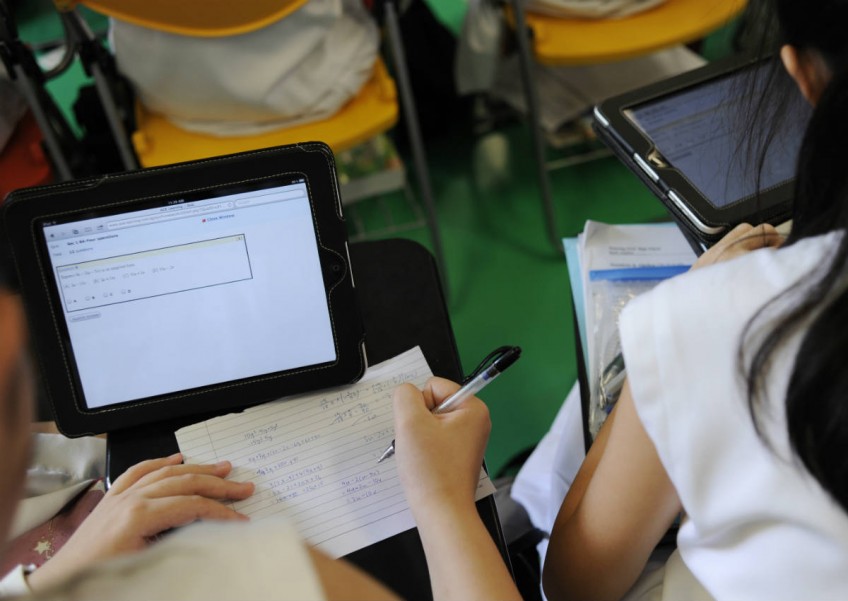Laptops in class: Learning aid or distraction?

Almost a decade ago, Australia introduced a programme to ensure every secondary school student in the country had a computer as part of a so-called "digital education revolution".
The A$2.4 billion (S$2.48 billion) programme was introduced by former prime minister Kevin Rudd, who held up a laptop and declared in 2007 that it was "the toolbox of the 21st century".
But the push to roll out technology in classrooms is facing a backlash, with some schools and teachers saying computers are a "distraction" and can hinder learning.
One of Australia's leading schools, Sydney Grammar School, which was attended by Prime Minister Malcolm Turnbull, has now banned students from bringing laptops to school. The elite private boys' school is also requiring students up to grade 10 - the third-last year of secondary school - to handwrite assignments.
The school's headmaster, Dr John Vallance, said the use of laptops and iPads in the classroom were a distraction and preventing students from being able to express themselves by writing.
"We see teaching as fundamentally a social activity," he told The Australian last week.
"It's about interaction between people, about discussion, about conversation. We find that having laptops or iPads in the classroom inhibits conversation - it's distracting."
Another school, St Paul's Catholic College in Sydney, said it has banned the use of laptops for one day a week to encourage students to play sport and to reduce reliance on the machines.
"Computers have been oversold and there is no evidence that they improve outcomes," the principal, Mr Mark Baker, told Fairfax Media yesterday. "The problem is maturity. They (students) are very good at using technology for social interaction but not for learning."
The Australian Education Union, which represents teachers, expressed support for limiting computer use rather than outright bans.
Its president, Ms Correna Haythorpe, said schools should consider ways to effectively incorporate technology, including protocols to ensure computers were being used for education purposes.
The use of computers in classrooms has become a vexed topic among schools and educators around the globe.
The Organisation for Economic Cooperation and Development has expressed concern about the potential overuse of technology in schools. Its research has found that as students use technology more intensively, their reading skills begin to drop substantially.
"The reality is that technology is doing more harm than good in our schools today," the organisation's director for education and skills, Mr Andreas Schleicher, reportedly told the Global Education and Skills Forum in Dubai last month.
According to OECD figures from 2012, Australia had the world's second-highest proportion of students using computers in school - 93.7 per cent, slightly behind the Netherlands. Singapore's figure was 69.9 per cent.
But Singapore was at the top of the OECD global education rankings for maths and science released last May, with Australia in 14th place.
Australia's place in the rankings has slipped in recent years, despite the promotion of technology in classrooms.
Experts in the country have expressed mixed views about the technology roll-out. Free computers were provided to secondary school students in year nine and above until 2014.
Since then, most schools have insisted that students bring their own tablet or laptop that can run on the schools' Wi-Fi network. The schools usually have extra computers to lend to students who cannot provide their own.
Some schools allow students to use textbooks in class rather than laptops and to hand in written assignments.
An expert on learning and technology, Professor Glenn Finger from Griffith University, said he did not agree with banning computers or requiring handwritten assignments but supported a "balanced" approach.
"To go the other way and not use any technology at all may not be productive either. You can have a blended learning approach which takes advantage of the technology and of excellent teaching," he told The Straits Times.
He likened banning computers to banning books. "For a student, it is dangerous to have a ban," he said. "Handwritten assignments are from a pre-1993 analogue world. It is not how most people in business or government or young people operate."
jonathanmpearlman@gmail.com

This article was first published on April 1, 2016.
Get a copy of The Straits Times or go to straitstimes.com for more stories.